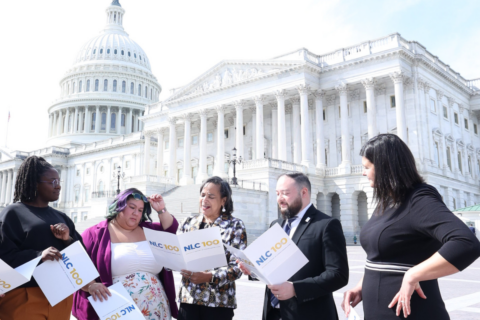In the face of pressing challenges confronting some law enforcement agencies nationwide, the U.S. Department of Justice unveiled a new report: “Recruitment and Retention for the Modern Law Enforcement Agency.” Published by the Office of Community Oriented Policing Services (COPS Office) and the Bureau of Justice Assistance (BJA), this report signals an urgent call for reform in recruitment and retention strategies. Below are highlights from the report’s recommendations about the pivotal role local elected officials can play in supporting police department recruitment and retention programs during this critical period.
1. Influence Recruitment and Eligibility
Local elected officials can advocate for alignment between eligibility requirements and community needs. By engaging diverse community members, officials bridge the gap between law enforcement and the community. You can champion updated eligibility criteria focusing on character traits and community-aligned values, ensuring standards remain high. Elected leaders can endorse the use of technology for efficient applications and consistent evaluation of online behavior, enhancing transparency. Encouraging evidence-based testing and assessing emotional intelligence and conflict resolution skills reshape the selection process to align with modern demands.
2. Enhance Training Methods
Officials play a key role in modernizing training methods. You can support a shift toward community-oriented mindsets and positive reinforcement. Collaboration with advocacy groups enriches recruits’ understanding of community dynamics. By endorsing mentorship programs and involving new officers in community outreach, officials strengthen the officer-public bond. They can also ensure that conflict resolution training, delivered by instructors reflecting organizational values, becomes a fundamental aspect of law enforcement education.
3. Improve Benefits and Incentives
Local elected officials can advocate for attractive benefits aligned with the preferences of the newer workforce. By assessing retirement options, offering portable investments and directing resources toward retention bonuses, officials can make law enforcement careers more desirable. This includes nontraditional benefits such as flexible schedules, parental leave and mental health coverage. Addressing specific concerns like childcare barriers fosters inclusivity within law enforcement agencies.
4. Prioritize Officer Wellness
Officials can collaborate with public-private partnerships to address officers’ well-being. You can advocate for affordable childcare, encourage the reevaluation of shift schedules to promote work-life balance and support the implementation of comprehensive wellness programs. Ensuring confidentiality in mental health care and involving officers in program development create a supportive environment. Acknowledging and accommodating diverse wellness needs should become essential components of wellness initiatives, fostering a healthier workforce.
5. Shape Organizational Culture
Elected leaders can drive change by advocating for a positive organizational culture. You can promote cultural assessments, endorse zero-tolerance policies against discrimination, and encourage open engagement with the community. Transparent communication addressing workplace inequities builds trust among officers and the community, fostering an environment of mutual respect and understanding.
6. Support Educational Partnerships
Partnerships with educational institutions are instrumental in shaping future law enforcement professionals. Local elected officials can collaborate with high schools and higher education institutions to create specialized courses and workshops. You can actively involve students from diverse disciplines, ensuring a broad talent pool for law enforcement careers. By endorsing these initiatives, officials empower educational institutions to prepare students effectively for law enforcement roles.
Local elected officials have an opportunity and responsibility to influence the modernization of law enforcement practices while also embracing and supporting broader public safety ecosystems. Through advocacy, support and policy influence, you can serve as a catalyst for positive change, fostering law enforcement agencies that are not only efficient and effective but also deeply connected and responsive to the communities they serve.








